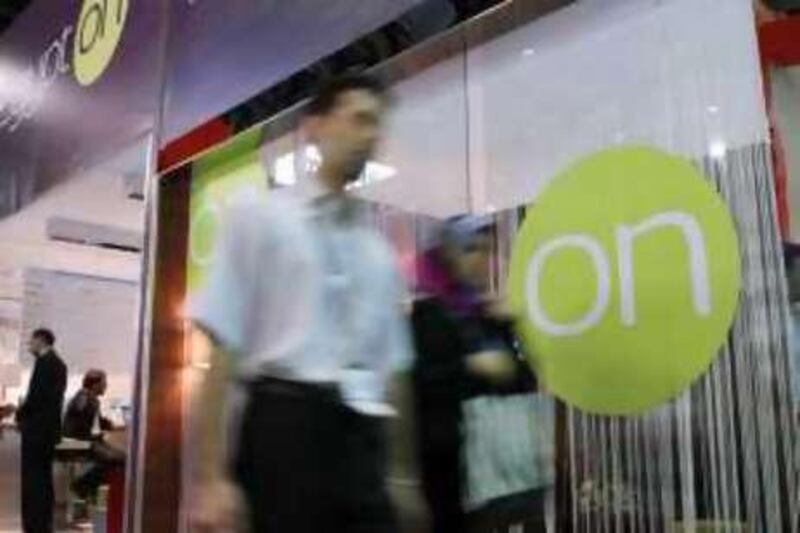Egyptian companies are leading the rush to meet demand as GCC companies and governments move to outsource much of their information technology efforts. Egypt had its largest-yet delegation at the Gitex technology conference this week in Dubai as emerging regional economies look to grab a share of hundreds of thousands of potential new jobs. Its delegation of more than 30 companies is riding on a slick branding campaign by the country's Information Technology Industry Development Association (Itida), reminiscent more of Madison Avenue than Cairo.
"Forget about camels and pharaohs," said an exhibitor from a software firm. "This is the new Egypt." A visitor to the Egyptian pavilion of previous trade shows and international events would typically be confronted by gaudy images of a golden king Tutankhamun, or camel-riding Bedouins circling Cairo's pyramids. But Itida's new brand, themed "Egypt: On" is minimalist and thoroughly modern, a point of pride for the many exhibitors and thousands of Egyptian visitors to the conference.
"Everybody thinks Egypt is a nice place for pyramids, camels, souks - they know it is not just a desert - but do they know about IT and outsourcing?" asked Hossam Megahed, a board member of Itida. "What we're saying is that there is a modern Egypt that exports IT." The Arab world's most populous country is finding a lucrative niche in both research and development and outsourcing focused on the Middle East, where technology spending is surging with a wider economic boom. The government plans for 150,000 new jobs in IT and outsourcing to be created by 2010; more than 15,000 have been created since the launch of a national IT plan in 2006.
"We originally planned to target the US and Canada," said Ahmed Badr, of ITWorx, one of Egypt's largest outsourcing businesses. "But it turned out the GCC grew much faster for us than the US market." The company now earns 60 per cent of its revenues from the Gulf. The lack of start-up financing in most Middle Eastern countries also drives many smaller businesses to seek out opportunities in the Gulf, where well-funded companies looking for niche services play a role similar to that of a western venture capitalist.
"There's still not that venture capital, people putting US$10 million (Dh36.7m) into a venture to see how it goes" said Taher el Shafei, the chief executive of SilverKey, an Egyptian software and internet development company. SilverKey employs 30 software developers in its Cairo offices and came to Gitex seeking to form strategic alliances with regional systems integrators wanting to outsource parts of projects.
Much of Egypt's potential for IT growth, its executives say, originates in a national reverence for technical education. The title "engineer" serves as a respected honorific in Egypt much like "doctor" would in the West, and almost 300,000 graduates from technical disciplines such as IT and engineering emerge from the country's university system each year. "The culture is also important," Mr Badr said. "We are Arabs, we understand the language, we understand the needs of people and their companies."
Morocco's growing technology industry is also focusing increasingly on the Gulf, in addition to its traditional market of the Francophone world. The North African nation has already established two IT investment parks in the style of Dubai's Internet City, with one on the outskirts of Casablanca having capacity for 30,000 workers. But while the country has made a healthy income from outsourcing the call centres and back offices of France, its IT leaders say its truly competitive niche is in software development.
"We are more oriented towards developing solutions, rather than outsourcing," said Mohamed Horani, the president of Morocco's Federation of Information Technology, Telecommunications and Outsourcing. "If you ask me how many countries are similar to the US, my answer will be none. It is unique. But if you ask me how many countries are similar to Morocco, I would say more than 100. So if we are able to implement a solution in Morocco, we can export this solution to more than 100 countries."
He uses the example of exchange controls, where the Moroccan government requires firms sending currency abroad to obtain prior authorisation, a common policy in developing nations attempting to protect their currency and reserves. "There are a lot of functionalities in our software that address this," he said. "And there are a lot of other countries with similar situations, so they have similar needs. There are many examples like this."
Aside from his role at the federation, Mr Horani is also the chairman of HDS, a software company that specialises in payment systems for financial institutions. Seven banks in the UAE and more than 30 in the Gulf use his company's software. Another country with a record delegation to Gitex this year is Jordan, whose national IT promotion body, Int@j, says the country's IT industry is growing by 20 per cent a year. The Jordanian government projects technology to become a $3 billion industry by 2011, with the country already home to some of the most innovative businesses in the region, including the Maktoob Group, which pioneered the development of Arabic-language blogging and user-generated content services online.
"The Gulf is already a huge market for us," said Abdulmajid Shamlawi, the chief executive of Int@j. "It can only get better - who wouldn't want to be doing business here today?" tgara@thenational.ae






